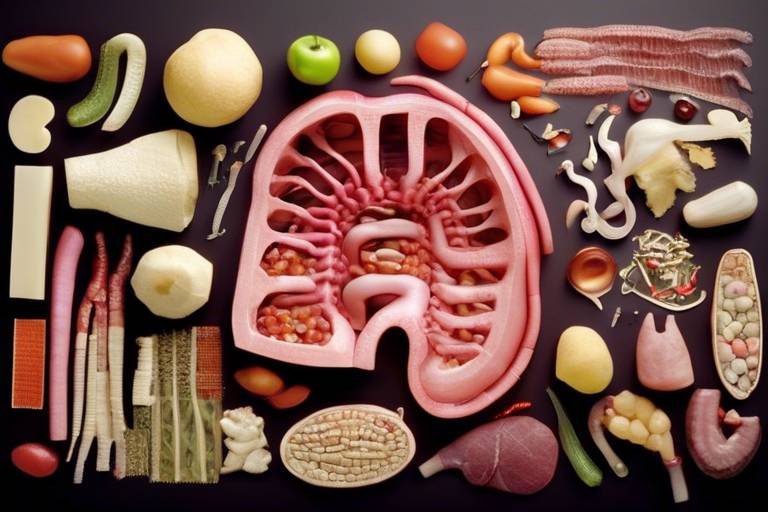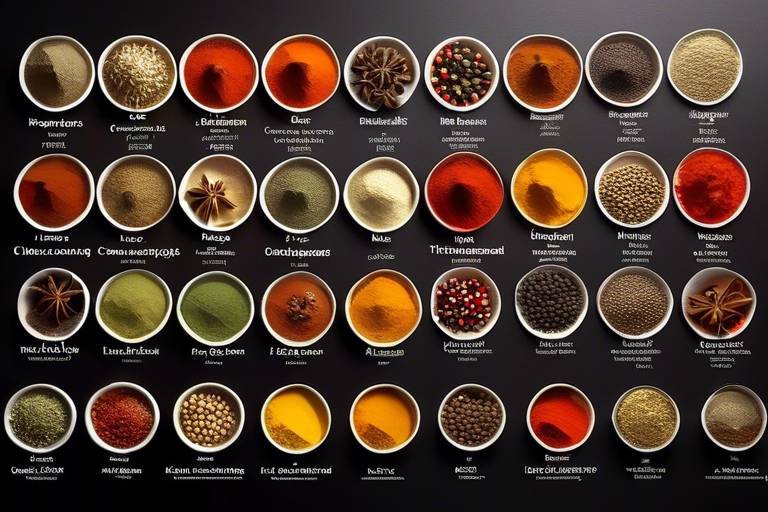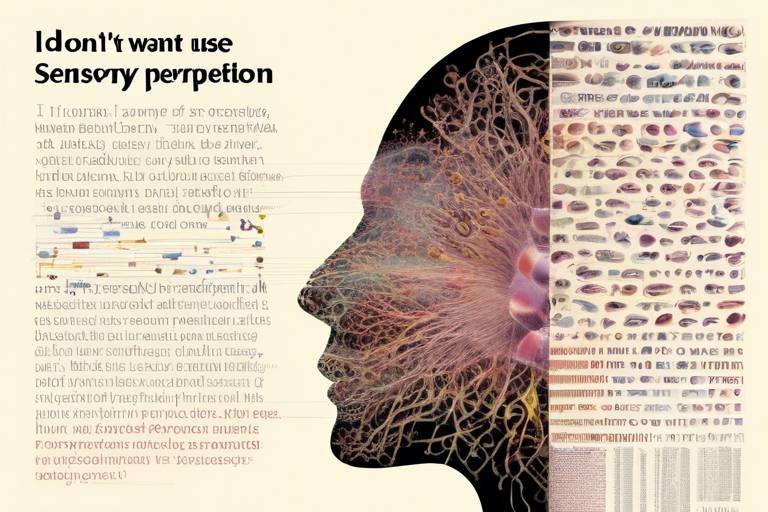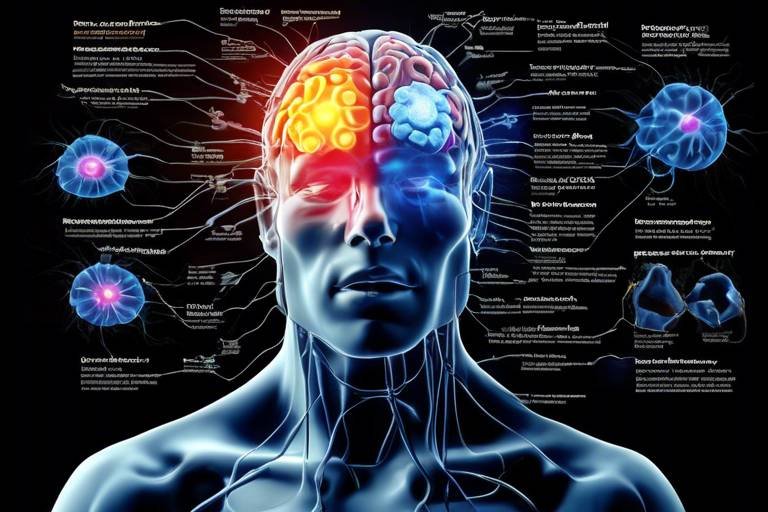The Biology of Chewing - Importance for Digestion
Have you ever stopped to think about the simple yet remarkable process of chewing? It’s something we do every day, often without a second thought, yet it plays a crucial role in our overall health and well-being. Chewing is not just about breaking down food; it’s a complex biological process that kickstarts digestion, enhances nutrient absorption, and even influences our oral health. In this article, we will delve into the fascinating mechanics of chewing, its effects on our body, and why we should pay more attention to this often-overlooked activity.
When we chew, our teeth and jaw work in perfect harmony to break food into smaller pieces. This mechanical action is vital because it increases the surface area of the food, making it easier for our digestive enzymes to do their job. Think of it as preparing a canvas before painting: the more texture and detail you have, the better your final artwork will be. Similarly, the more thoroughly we chew, the more efficiently our body can extract nutrients from the food we consume.
But the importance of chewing goes beyond just breaking down food. It also plays a significant role in stimulating saliva production. Saliva is often overlooked, yet it contains essential enzymes and compounds that begin the digestive process right in the mouth. This means that effective chewing not only helps in mechanically breaking down food but also chemically prepares it for further digestion in the stomach and intestines.
Moreover, chewing has a profound impact on our taste perception. When we chew, we stimulate our taste buds, enhancing the flavors of the food we eat. This sensory experience encourages us to enjoy a varied and balanced diet, which is crucial for maintaining our health. Imagine eating a delicious piece of chocolate; the more you chew, the richer and more complex the flavors become, making the experience all the more enjoyable. This connection between chewing and taste is a powerful motivator for healthy eating habits.
Another critical aspect to consider is hydration. Adequate fluid intake is essential for saliva production, and without enough water, our bodies can struggle to produce the saliva necessary for effective digestion. This highlights the intricate relationship between what we drink, how we chew, and how well we digest our food. Staying hydrated not only supports saliva production but also improves our chewing efficiency, leading to better overall digestive health.
In summary, the act of chewing is far more than a simple mechanical process; it is an essential component of our digestive system. By understanding its importance, we can make more conscious choices about how we eat, leading to better health outcomes. So, the next time you sit down for a meal, take a moment to appreciate the incredible biology of chewing!

The Mechanics of Chewing
This article explores the essential role of chewing in the digestive process, highlighting its impact on nutrient absorption, oral health, and overall well-being.
Understanding the physical process of chewing reveals how our teeth and jaw work together to break down food, making it easier for the body to digest and absorb nutrients. When you take a bite of food, your teeth act like a powerful machine, grinding and tearing the food into smaller pieces. This process is not just about breaking food down; it’s a complex dance involving various muscles and bones. The jaw muscles, primarily the masseter and temporalis, contract to bring the upper and lower jaws together, creating the force needed to chew. Each time you chew, these muscles engage in a rhythmic motion, which is essential for effective digestion.
The sequence of chewing involves several stages:
- Initial Bite: The first contact of food with teeth.
- Grinding: The teeth work together, with molars playing a crucial role in crushing food.
- Mixing: The food is mixed with saliva, which is vital for the next steps in digestion.
- Swallowing: Once the food is adequately chewed and mixed, it forms a bolus ready for swallowing.
Moreover, chewing is not just a mechanical process; it’s also a sensory experience. As you chew, you stimulate your taste buds, which send signals to your brain, enhancing your enjoyment of food. This sensory feedback loop encourages you to eat a more varied and balanced diet, as the more you chew, the more flavors are released, prompting you to explore different tastes and textures.
In addition to its role in digestion, the mechanics of chewing also play a significant part in oral health. Chewing stimulates the gums and increases saliva production, which helps to wash away food particles and neutralize acids produced by bacteria in the mouth. This natural process is vital for preventing cavities and maintaining a healthy oral environment. Without proper chewing, food particles can remain lodged between teeth, leading to plaque buildup and potential dental issues.
In summary, the mechanics of chewing are fundamental to not only how we digest food but also to our overall health. By understanding this process, we can appreciate the importance of taking our time to chew thoroughly, allowing our bodies to work efficiently and effectively. So, the next time you sit down to eat, remember that each bite is an opportunity to optimize your health!
Q: Why is chewing important for digestion?
A: Chewing breaks down food into smaller pieces, increasing its surface area and making it easier for enzymes to digest. It also mixes food with saliva, which contains enzymes that begin the digestive process.
Q: How does chewing affect oral health?
A: Chewing stimulates saliva production, which helps wash away food particles and neutralize acids, reducing the risk of cavities and promoting gum health.
Q: What are the consequences of inadequate chewing?
A: Inadequate chewing can lead to larger food particles entering the digestive system, making it harder for the body to absorb nutrients and potentially causing digestive discomfort.

The Role of Saliva
Saliva is often overlooked, yet it plays a crucial role in the digestive process. This clear liquid produced by the salivary glands is not just for keeping your mouth moist; it’s a powerhouse of digestive enzymes and other important substances. Think of saliva as the unsung hero of digestion, preparing food for the journey through your digestive system. When you chew, saliva mixes with food, initiating the breakdown of nutrients right in your mouth. This is where the magic begins!
One of the primary functions of saliva is to aid in the breakdown of food. It contains enzymes that help to start the digestive process even before the food reaches the stomach. For instance, the enzyme amylase is present in saliva and begins the digestion of carbohydrates. This means that the moment you take a bite and start chewing, your body is already working hard to extract the nutrients it needs. It’s like having a little factory in your mouth, churning out enzymes to help you get the most out of your meals.
Saliva isn’t just a simple fluid; it’s a complex mixture that includes various enzymes, electrolytes, and proteins. The presence of amylase is particularly significant as it kickstarts the digestion of carbohydrates. When you chew your food, the action of chewing releases these enzymes, allowing them to interact with the food particles. This enzymatic action is vital for breaking down starches into simpler sugars, which can be easily absorbed by the body later on. Imagine trying to build a house without the right tools; without saliva, your body would struggle to break down food effectively.
Chewing and saliva production also play a significant role in enhancing flavor perception. When you chew, you release flavor compounds from the food, allowing your taste buds to experience a burst of flavors. This not only makes eating more enjoyable but also encourages a varied and balanced diet. The more flavors you can taste, the more likely you are to explore different foods, which is essential for your overall health. It’s like a culinary adventure happening right in your mouth!
Hydration is key to maintaining optimal saliva production. When you’re well-hydrated, your body can produce enough saliva to aid in digestion effectively. However, if you’re not drinking enough fluids, your saliva production can decrease, leading to dry mouth and potentially affecting your ability to chew and swallow food. This highlights the connection between fluid intake, chewing efficiency, and digestive health. Just like a plant needs water to thrive, your body needs adequate hydration to support its digestive processes.
In summary, saliva is an essential component of digestion that should not be underestimated. From aiding in food breakdown to enhancing flavor perception and ensuring optimal hydration, its role is multifaceted and critical. So, the next time you enjoy a meal, take a moment to appreciate the hard work your saliva is doing to help you digest and absorb nutrients effectively!
- What is the primary function of saliva? Saliva helps in breaking down food, aids in taste perception, and keeps the mouth moist.
- How does saliva aid in digestion? Saliva contains enzymes like amylase that start the digestion of carbohydrates right in the mouth.
- Can dehydration affect saliva production? Yes, inadequate hydration can lead to reduced saliva production, impacting digestion and oral health.

Enzymatic Action in Saliva
This article explores the essential role of chewing in the digestive process, highlighting its impact on nutrient absorption, oral health, and overall well-being.
Understanding the physical process of chewing reveals how our teeth and jaw work together to break down food, making it easier for the body to digest and absorb nutrients.
Saliva plays a crucial role in digestion, aiding in the breakdown of food and providing enzymes that initiate the digestive process right in the mouth.
When we chew, our saliva isn't just a passive fluid; it's a powerful digestive ally! Saliva contains several enzymes that kickstart the digestive process even before food reaches the stomach. One of the most important enzymes is amylase, which specifically targets carbohydrates. This means that the moment you take a bite of bread or pasta, amylase is already hard at work breaking down those complex carbohydrates into simpler sugars.
This enzymatic action is crucial because it not only aids in digestion but also enhances the overall flavor experience. As we chew, the food mixes with saliva, releasing flavors that make eating a more enjoyable experience. Imagine chewing a piece of fruit; the sweetness you taste is partly due to the breakdown of sugars by amylase. The more we chew, the more we activate these enzymes, making our meals not just nutritious but also delicious.
Furthermore, the efficiency of these enzymes can be influenced by various factors, including:
- Hydration: A well-hydrated body produces ample saliva, ensuring optimal enzymatic activity.
- Food Texture: Softer foods may require less chewing, potentially leading to inadequate enzyme activation.
- Health Conditions: Certain medical issues can affect saliva production, impacting digestion.
In summary, the enzymatic action in saliva is a vital part of the digestive process, demonstrating that chewing is not just a mechanical action but a complex interaction of biology and flavor. The next time you sit down for a meal, remember that each chew is a step towards better digestion and nutrient absorption!
Chewing stimulates taste buds, enhancing flavor perception and encouraging the consumption of a varied and balanced diet, which is vital for overall health.
Adequate hydration is essential for saliva production, emphasizing the connection between fluid intake, chewing efficiency, and digestive health.
Effective chewing increases the surface area of food particles, facilitating better nutrient absorption in the intestines and optimizing the digestive process.
Chewing not only aids digestion but also contributes to oral health by stimulating gums, preventing tooth decay, and maintaining a healthy balance of oral bacteria.
Regular chewing can help prevent dental issues by promoting saliva flow, which neutralizes acids and washes away food particles, reducing the risk of cavities.
Chewing exercises the jaw muscles, promoting strength and flexibility, which is essential for maintaining overall oral function and health.
Cultural practices surrounding chewing vary widely, influencing dietary habits and the types of foods consumed, showcasing the diverse significance of chewing in human societies.
Many cultures have unique chewing practices, such as chewing betel leaves or other substances, which can have both social and health implications.
The shift towards fast food and processed meals has affected chewing habits, often leading to inadequate chewing and potential digestive issues, highlighting the need for mindful eating.
- Why is chewing important for digestion? Chewing breaks down food into smaller pieces, making it easier for enzymes to digest and absorb nutrients.
- How does saliva aid in digestion? Saliva contains enzymes like amylase that begin breaking down carbohydrates, enhancing nutrient absorption.
- Can poor chewing habits affect my health? Yes, inadequate chewing can lead to digestive issues and reduced nutrient absorption.
- What can I do to improve my chewing habits? Focus on eating slowly, savoring each bite, and staying hydrated to enhance saliva production.

Impact on Taste Perception
This article explores the essential role of chewing in the digestive process, highlighting its impact on nutrient absorption, oral health, and overall well-being.
Understanding the physical process of chewing reveals how our teeth and jaw work together to break down food, making it easier for the body to digest and absorb nutrients.
Saliva plays a crucial role in digestion, aiding in the breakdown of food and providing enzymes that initiate the digestive process right in the mouth.
Saliva contains enzymes like amylase that begin the digestion of carbohydrates, showcasing the importance of chewing in activating these digestive processes early.
Chewing is not just about breaking down food; it also significantly influences our taste perception. When we chew, we release flavors that are locked within the food, allowing our taste buds to fully engage with the meal. This process is akin to unwrapping a gift; the more you unwrap, the more you discover. The act of chewing helps to mix food with saliva, which contains enzymes and compounds that enhance flavor. As we chew, the surface area of the food increases, allowing for more interaction with the taste buds located on our tongue.
Moreover, this interaction is crucial for our overall eating experience. When we chew thoroughly, we not only enjoy the flavors better but also encourage ourselves to eat a wider variety of foods. This variety is vital for maintaining a balanced diet, as different foods provide different nutrients. In fact, studies have shown that people who take their time to chew their food tend to enjoy their meals more and make healthier food choices. This is because the enhanced flavor perception encourages the consumption of fruits, vegetables, and other nutrient-rich foods.
In addition to flavor, chewing also affects the texture of food, which can significantly influence our preference and satisfaction. Imagine biting into a crunchy apple versus a mushy one; the texture can make or break our enjoyment. The more we chew, the more we engage with the food's texture, which can create a more fulfilling eating experience. Therefore, taking the time to chew not only enhances flavor but also adds to the overall sensory experience of eating.
Adequate hydration is essential for saliva production, emphasizing the connection between fluid intake, chewing efficiency, and digestive health.
Effective chewing increases the surface area of food particles, facilitating better nutrient absorption in the intestines and optimizing the digestive process.
Chewing not only aids digestion but also contributes to oral health by stimulating gums, preventing tooth decay, and maintaining a healthy balance of oral bacteria.
Regular chewing can help prevent dental issues by promoting saliva flow, which neutralizes acids and washes away food particles, reducing the risk of cavities.
Chewing exercises the jaw muscles, promoting strength and flexibility, which is essential for maintaining overall oral function and health.
Cultural practices surrounding chewing vary widely, influencing dietary habits and the types of foods consumed, showcasing the diverse significance of chewing in human societies.
Many cultures have unique chewing practices, such as chewing betel leaves or other substances, which can have both social and health implications.
The shift towards fast food and processed meals has affected chewing habits, often leading to inadequate chewing and potential digestive issues, highlighting the need for mindful eating.
- Why is chewing important for digestion? Chewing breaks down food into smaller pieces, making it easier for the digestive system to process and absorb nutrients.
- How does chewing affect taste perception? Chewing releases flavors locked in food and enhances the overall sensory experience, making meals more enjoyable.
- Can inadequate chewing lead to health issues? Yes, not chewing food properly can lead to digestive problems, as larger pieces are harder for the body to break down.
- What role does saliva play in chewing? Saliva contains enzymes that help break down food and enhance flavor perception, making chewing more effective.

Hydration and Saliva Production
Staying hydrated is more than just quenching thirst; it plays a pivotal role in the production of saliva, which is essential for effective chewing and digestion. Our bodies are composed of about 60% water, and this fluid is crucial for many bodily functions, including maintaining the right balance of saliva. When we consume food, saliva is the first line of defense in breaking it down, making hydration a key player in this process.
Imagine trying to run a car without oil; it simply won't function properly. Similarly, without adequate hydration, our salivary glands struggle to produce enough saliva, which can lead to dry mouth and hinder the entire digestive process. Saliva not only helps in breaking down food but also lubricates it, making it easier to swallow and ensuring that nutrients are more accessible for absorption in the intestines.
Moreover, the connection between hydration and saliva production goes beyond just digestion. Sufficient saliva flow helps to wash away food particles and neutralize acids in the mouth, which can prevent tooth decay and maintain oral health. A well-hydrated body means a well-hydrated mouth, which is essential for keeping our teeth and gums healthy.
To illustrate the significance of hydration on saliva production, consider the following table:
| Hydration Level | Saliva Production | Effects on Digestion |
|---|---|---|
| Well-Hydrated | Optimal | Efficient breakdown and absorption of nutrients |
| Moderately Hydrated | Reduced | Slower digestion, potential discomfort |
| Dehydrated | Minimal | Increased risk of digestive issues and oral health problems |
In essence, staying hydrated is not just about drinking enough water; it’s about understanding how it impacts our chewing efficiency and overall digestive health. So, the next time you sit down for a meal, remember to sip on some water before you dig in. Keeping your body well-hydrated will not only enhance your chewing experience but also promote better nutrient absorption and support your oral health.
- How much water should I drink daily? It’s generally recommended to drink at least 8 glasses of water a day, but individual needs may vary based on activity level and climate.
- Can dehydration affect my chewing? Absolutely! Insufficient hydration can lead to dry mouth, making it difficult to chew and swallow food properly.
- What are the signs of dehydration? Common signs include thirst, dark yellow urine, fatigue, and dry mouth.
- Are there foods that can help with hydration? Yes! Foods like cucumbers, watermelon, and oranges have high water content and can contribute to your daily hydration needs.

Chewing and Nutrient Absorption
When it comes to digestive health, the act of chewing is often overlooked, yet it plays a monumental role in how effectively our bodies absorb nutrients. Think of chewing as the first step in a complex dance that prepares food for its journey through the digestive system. Each time we chew, we are not just breaking down food into smaller pieces; we are significantly increasing the surface area of those food particles. This is crucial because the larger the surface area, the easier it is for digestive enzymes to break down the food further in the intestines.
Moreover, effective chewing helps to mix food with saliva, which contains essential enzymes that begin the digestive process right in the mouth. This initial breakdown is vital as it ensures that when food reaches the stomach, it is in an optimal state for further digestion. For instance, carbohydrates begin to be digested by the enzyme amylase found in saliva, allowing the body to access energy more efficiently. Without proper chewing, these processes can be hindered, leading to less nutrient absorption.
Interestingly, studies have shown that people who take their time to chew their food thoroughly tend to consume fewer calories overall. This is likely due to the increased sensation of fullness that comes with proper chewing. When we chew slowly, our bodies have more time to send signals to our brains that we are satiated, which can help prevent overeating. In contrast, when we rush through meals, we often swallow larger chunks of food that require more digestive effort, making it difficult for our bodies to extract all the nutrients they need.
To illustrate the impact of chewing on nutrient absorption, consider the following table that summarizes the relationship between chewing efficiency and nutrient uptake:
| Chewing Efficiency | Nutrient Absorption Rate | Potential Health Implications |
|---|---|---|
| High (thorough chewing) | Optimal | Better energy levels, improved digestion |
| Moderate (average chewing) | Average | Possible nutrient deficiencies, bloating |
| Low (inadequate chewing) | Poor | Digestive discomfort, increased weight gain |
In summary, the simple act of chewing is a critical component of the digestive process that significantly impacts our nutrient absorption. By taking the time to chew our food properly, we not only enhance our body's ability to extract essential vitamins and minerals but also promote a healthier relationship with food. So, the next time you sit down for a meal, remember that chewing is more than just a mechanical action; it's a vital part of nourishing your body.
- Why is chewing important for digestion? Chewing breaks down food into smaller particles, increasing surface area for enzymes to work on, which enhances nutrient absorption.
- How does chewing affect weight management? Chewing slowly can help you feel full sooner, potentially leading to lower calorie intake and better weight management.
- Can inadequate chewing lead to digestive problems? Yes, not chewing food thoroughly can cause digestive discomfort and hinder nutrient absorption.
- What role does saliva play in chewing? Saliva contains enzymes that begin the digestion of food and helps in lubricating it for easier swallowing.

Chewing and Oral Health
Chewing does more than just break down our food; it plays a crucial role in maintaining oral health. When we chew, our teeth and gums engage in a workout that promotes blood circulation in the mouth, which is essential for healthy gum tissue. This process not only helps to keep our gums strong but also aids in the prevention of various dental issues. Regular chewing can stimulate the production of saliva, which acts as a natural defense against tooth decay. Saliva is rich in minerals that help to neutralize harmful acids produced by bacteria in the mouth. Without adequate chewing, we risk creating an environment where these bacteria can thrive, leading to cavities and gum disease.
Moreover, the act of chewing can help in clearing food particles from between our teeth. When we chew, the friction created helps to dislodge bits of food that may be stuck, reducing the risk of plaque buildup. Plaque is a sticky film of bacteria that can harden into tartar if not removed, leading to more serious oral health issues. Therefore, effective chewing is not just about breaking down food; it’s also about maintaining a clean mouth.
Additionally, chewing exercises our jaw muscles, keeping them strong and flexible. This is particularly important as we age, as strong jaw muscles can help prevent issues such as temporomandibular joint (TMJ) disorders. A strong jaw also contributes to a proper bite, which is essential for overall oral function. In essence, the act of chewing is a multi-faceted contributor to oral health, intertwining aspects of hygiene, muscle strength, and disease prevention.
To further illustrate the importance of chewing in oral health, let’s look at the benefits in a simple table format:
| Benefit | Description |
|---|---|
| Stimulates Saliva Production | Helps neutralize acids and wash away food particles. |
| Prevents Plaque Buildup | Friction from chewing dislodges food particles. |
| Strengthens Jaw Muscles | Maintains jaw function and prevents disorders. |
| Promotes Healthy Gums | Increases blood flow to gum tissues. |
In conclusion, chewing is an essential habit that significantly impacts our oral health. By being mindful of how we chew our food, we can enhance our overall well-being, prevent dental issues, and ensure that our mouths remain healthy and functional for years to come. So next time you sit down for a meal, take a moment to appreciate the simple yet profound act of chewing!
1. How does chewing help prevent cavities?
Chewing stimulates saliva production, which helps to neutralize acids and wash away food particles, reducing the risk of cavities.
2. Can chewing gum improve oral health?
Yes, chewing sugar-free gum can stimulate saliva flow, which aids in cleaning the mouth and preventing tooth decay.
3. What happens if I don’t chew my food properly?
Inadequate chewing can lead to digestive issues, as larger food particles are harder for the stomach to break down, potentially causing discomfort.
4. Are there any foods that are better for chewing?
Foods that require more chewing, such as raw vegetables and whole grains, can be beneficial for oral health and digestion.

Prevention of Dental Issues
When we think about maintaining our dental health, we often focus on brushing, flossing, and regular dental check-ups. However, one of the most overlooked aspects is the act of chewing. Yes, you heard that right! Chewing plays a significant role in preventing dental issues, and here's why. Every time we chew, we stimulate the production of saliva, which is nature's own mouthwash. Saliva is packed with minerals that help to neutralize acids produced by bacteria in our mouths. This is crucial because these acids can lead to tooth decay and cavities if left unchecked.
Moreover, chewing helps in washing away food particles that may cling to our teeth after meals. Think of it as a natural cleaning mechanism. The more we chew, the more saliva we produce, which means more cleaning action against those pesky food remnants. This is particularly important for sticky or sugary foods that can easily lead to dental problems. Regular chewing can significantly reduce the risk of cavities and gum disease, allowing us to maintain a healthy mouth.
Another fascinating aspect of chewing is its role in strengthening our gums. When we bite down on food, it creates a gentle pressure that stimulates the gums and promotes blood circulation. This not only helps to keep our gums healthy but also supports the overall structure of our teeth. Strong gums act as a protective barrier against infections and other dental issues.
To illustrate the importance of chewing in dental health, let’s look at some key benefits:
- Increased Saliva Production: Helps neutralize harmful acids and wash away food particles.
- Strengthened Gums: Promotes better blood circulation and overall gum health.
- Reduced Risk of Cavities: Regular chewing can significantly decrease the likelihood of tooth decay.
It's also worth noting that the type of food we chew matters. Crunchy fruits and vegetables, like apples and carrots, not only require more chewing but also provide additional nutrients and fiber that contribute to oral health. Incorporating these foods into our diet can be a delicious way to enhance our dental hygiene while enjoying the benefits of chewing.
In conclusion, the simple act of chewing can have profound effects on our dental health. By making a conscious effort to chew our food thoroughly, we can enjoy not only better digestion but also a healthier mouth. So, the next time you sit down for a meal, take your time and savor each bite. Your teeth and gums will thank you!
1. How does chewing help prevent cavities?
Chewing stimulates saliva production, which helps neutralize acids and wash away food particles that can lead to cavities.
2. What types of food are best for dental health?
Crunchy fruits and vegetables, such as apples and carrots, are excellent choices as they require more chewing and provide beneficial nutrients.
3. Can chewing gum be beneficial for dental health?
Yes, sugar-free chewing gum can help increase saliva flow and aid in cleaning the mouth after meals, but it should not replace regular brushing and flossing.
4. How often should I chew my food?
It's recommended to chew each bite thoroughly until the food is well broken down, which aids in digestion and promotes better oral health.

Chewing and Jaw Strength
When you think about chewing, you might just consider it a mundane part of eating, but it’s so much more than that! Chewing isn't just about breaking down food; it's a workout for your jaw muscles! Just like any other muscle in your body, your jaw muscles need exercise to stay strong and flexible. When you chew, you engage several muscles, including the masseter, which is one of the strongest muscles in the human body. This muscle works hard to help you grind and tear food, but it also plays a crucial role in maintaining the overall function of your mouth and jaw.
In fact, regular chewing can help prevent jaw disorders such as temporomandibular joint (TMJ) dysfunction. TMJ issues can lead to chronic pain and discomfort, making it difficult to eat or even speak. By actively using your jaw muscles through chewing, you can enhance their strength and flexibility, reducing the risk of these painful conditions. Think of it like lifting weights for your jaw – the more you use it, the stronger it gets!
Moreover, the act of chewing stimulates the production of synovial fluid, which lubricates the joints in your jaw. This lubrication is essential for smooth movement and can help prevent stiffness. When you chew food thoroughly, you’re not only aiding digestion but also promoting healthy jaw function. This is particularly important as we age, as many people experience a decline in jaw strength and mobility over time.
Interestingly, the type of food you chew can also influence jaw strength. Foods that require more effort to chew, such as raw vegetables and tougher cuts of meat, provide a greater workout for your jaw. On the other hand, processed foods that are soft and easy to chew may not offer the same benefits. Therefore, incorporating a variety of textures into your diet can be beneficial for maintaining a strong jaw.
In summary, chewing is an essential activity that contributes to jaw strength and health. It’s a simple yet effective way to keep your jaw muscles engaged and functioning well. So, the next time you sit down for a meal, remember that every bite is not just about satisfying your hunger; it’s also a chance to give your jaw a workout!
- How does chewing affect my overall health? Chewing aids digestion, promotes oral health, and strengthens jaw muscles, contributing to your overall well-being.
- Can chewing too much cause jaw pain? Yes, excessive chewing can lead to jaw fatigue and discomfort. Balance is key!
- What types of foods should I chew for better jaw strength? Foods that are crunchy and require more effort, like raw vegetables and nuts, are excellent for jaw exercise.
- How often should I chew my food? It's recommended to chew each bite around 20-30 times to aid digestion and maximize nutrient absorption.

Chewing in Different Cultures
Chewing is not just a mechanical act; it’s a cultural phenomenon that varies significantly across the globe. In many societies, the way we chew reflects our culinary traditions, social interactions, and even health practices. For instance, in some Asian cultures, chewing betel leaves, often mixed with areca nut and slaked lime, is a common practice that dates back centuries. This ritualistic chewing is not only a social activity but also believed to have stimulating effects, showcasing how chewing can intertwine with cultural identity.
On the flip side, in Western cultures, the rise of fast food has led to a noticeable shift in chewing habits. Many people consume their meals on the go, often leading to hurried eating and insufficient chewing. This can result in various digestive issues, as the food isn’t adequately broken down before it reaches the stomach. The modern lifestyle, with its emphasis on convenience, has inadvertently encouraged a culture of quick bites rather than mindful chewing, which is essential for proper digestion.
Interestingly, chewing also plays a role in social bonding. In many cultures, sharing food and chewing together is a way to foster relationships. For example, in Mediterranean countries, communal meals are common, where the act of chewing becomes a shared experience, enhancing the flavors and the connections between people. The sounds of chewing and laughter often fill the air, creating an atmosphere of camaraderie that is hard to replicate in solitary eating.
Moreover, the types of food we chew vary widely. In some cultures, tough and fibrous foods are staples, requiring significant chewing effort, while others may rely on softer, processed foods that require less chewing. This difference can impact not only our digestive health but also our dental health. For instance, cultures that emphasize chewing tougher foods often have stronger jaw muscles and healthier teeth, as the act of chewing stimulates gums and promotes saliva production, which is crucial for oral health.
To illustrate the cultural significance of chewing, here’s a brief overview of some traditional chewing practices around the world:
| Culture | Chewing Practice | Health Implications |
|---|---|---|
| South Asia | Chewing betel leaves | Stimulant effects, potential health risks from areca nut |
| Middle East | Chewing khat leaves | Stimulant effects, social bonding |
| Western Countries | Fast food consumption | Potential digestive issues, less mindful eating |
| Mediterranean | Shared meals | Strengthens social bonds, enhances flavor experiences |
In summary, chewing is a multifaceted act deeply rooted in cultural practices. Whether it’s the communal aspect of sharing a meal or the individual health benefits derived from proper chewing, it’s clear that this simple act carries significant weight in our lives. As we navigate through different cultures, it becomes essential to appreciate the diverse ways in which chewing shapes our experiences, health, and relationships.
- Why is chewing important for digestion?
Chewing breaks down food into smaller particles, making it easier for enzymes to digest and absorb nutrients effectively. - How does culture influence chewing habits?
Cultural practices dictate the types of foods consumed and the social contexts in which eating occurs, impacting how and why we chew. - What are the health benefits of chewing food properly?
Proper chewing promotes better digestion, enhances nutrient absorption, and supports oral health by stimulating saliva production.

Traditional Chewing Practices
Throughout history, traditional chewing practices have played a significant role in various cultures, often intertwining with social rituals, health beliefs, and culinary traditions. For instance, in many Asian cultures, the practice of chewing betel leaves is not just a dietary choice but a cultural cornerstone. The act of chewing betel is often a communal activity, fostering social connections and serving as a symbol of hospitality. These leaves, when combined with areca nut and slaked lime, create a stimulating effect that many find enjoyable. However, it's important to note that while this practice is culturally significant, it can also have health implications, such as an increased risk of oral cancer.
In Africa, the chewing of kola nuts is prevalent among various tribes. Kola nuts are often chewed during social gatherings and ceremonies, symbolizing friendship and respect. The caffeine and theobromine found in kola nuts provide a mild stimulant effect, which can enhance alertness and energy levels. This practice highlights how chewing can serve both social and functional purposes, bridging the gap between nourishment and community bonding.
Meanwhile, in some indigenous cultures of South America, the act of chewing coca leaves has been a traditional practice for centuries. Coca leaves are known to alleviate fatigue and hunger, making them a vital part of daily life in high-altitude regions. Chewing coca leaves releases alkaloids that can provide energy and reduce feelings of hunger, illustrating how traditional chewing practices are often tailored to meet the specific needs of the environment and lifestyle.
Interestingly, traditional chewing practices can also be seen in the Western world, where chewing gum has evolved into a popular pastime. Originally, gum was made from natural resins, and today, it often contains sweeteners and flavorings. Chewing gum is not only a way to freshen breath but also serves as a stress-relief mechanism for many, showcasing how even modern chewing practices are influenced by age-old traditions of oral engagement.
As we explore these diverse practices, it becomes evident that chewing is much more than a mechanical process; it is a rich tapestry of cultural significance. From social bonding to health benefits, traditional chewing practices reveal the multifaceted role that this simple act plays in human societies around the globe. Understanding these practices encourages us to appreciate the cultural heritage behind our eating habits and the importance of mindful chewing.
- What are some common traditional chewing practices around the world?
Common practices include chewing betel leaves in Asia, kola nuts in Africa, and coca leaves in South America, each with unique cultural significance and health implications.
- Are there health risks associated with traditional chewing practices?
Yes, practices such as chewing betel leaves can increase the risk of oral cancer, while excessive consumption of kola nuts may lead to caffeine-related issues.
- How do traditional chewing practices influence modern eating habits?
Modern eating habits, particularly the consumption of fast food, have led to a decline in traditional chewing practices, emphasizing the need for mindful eating to promote better digestion and health.

Modern Eating Habits
In today's fast-paced world, our eating habits have undergone a significant transformation. Gone are the days when meals were savored and enjoyed at a leisurely pace. Instead, we find ourselves in a whirlwind of responsibilities, often opting for convenience over mindfulness. This shift has profound implications for our chewing habits and, consequently, our digestive health. Have you ever noticed how you might rush through a meal, barely chewing your food? This hurried approach can lead to a myriad of digestive issues, from bloating to inadequate nutrient absorption.
Modern eating habits are largely characterized by:
- Fast Food Consumption: The rise of fast food chains has made it all too easy to grab a quick bite on the go. While this is convenient, it often means that we consume highly processed foods that require less chewing, which can hinder proper digestion.
- Processed Foods: Many people now rely on pre-packaged meals that are designed for quick preparation. These foods are often soft and easy to eat, but they can lack the textures that promote thorough chewing.
- Multitasking During Meals: How often do we eat while working, scrolling through our phones, or watching TV? This multitasking can distract us from the act of eating, leading to less attention paid to chewing and savoring our food.
As a result of these habits, many individuals may not realize the importance of chewing their food properly. Chewing is not just a mechanical process; it’s a crucial step in the digestive journey. When we chew our food adequately, we break it down into smaller particles, increasing the surface area for enzymes to do their job effectively. This is especially important for foods rich in fiber, which require more effort to digest. Without proper chewing, we can miss out on essential nutrients, leading to deficiencies over time.
Moreover, the lack of mindful eating can affect our relationship with food. When we eat quickly, we may not fully appreciate the flavors and textures of what we're consuming. This can lead to overeating, as our brains don’t have enough time to register fullness signals. It’s almost like racing through a beautiful landscape without taking a moment to admire the view. The experience is diminished, and so is our satisfaction.
To counteract these modern eating habits, it’s essential to cultivate a more mindful approach to our meals. Here are a few tips to help you reconnect with the act of chewing:
- Slow Down: Take your time during meals. Set aside distractions and focus on enjoying your food.
- Chew Thoroughly: Aim to chew each bite at least 20-30 times. This not only aids digestion but also enhances flavor perception.
- Appreciate Your Food: Take a moment to savor each bite. Notice the flavors, textures, and aromas that make your meal special.
By embracing these practices, we can improve our digestive health and foster a better connection with our food. In a world that often prioritizes speed and convenience, taking the time to chew and enjoy our meals can be a revolutionary act of self-care.
1. Why is chewing important for digestion?
Chewing breaks down food into smaller particles, increasing the surface area for digestive enzymes to work effectively, leading to better nutrient absorption.
2. How can I improve my chewing habits?
Try to slow down during meals, chew each bite thoroughly, and eliminate distractions to enhance your eating experience.
3. What are the consequences of not chewing enough?
Inadequate chewing can lead to digestive issues, nutrient deficiencies, and a poor relationship with food, causing overeating or discomfort.
4. Are there specific foods that require more chewing?
Foods high in fiber, such as raw vegetables, whole grains, and nuts, typically require more chewing and can greatly benefit from it.
Frequently Asked Questions
- Why is chewing important for digestion?
Chewing is crucial for digestion because it breaks down food into smaller particles, making it easier for the body to digest and absorb nutrients. When we chew, we increase the surface area of the food, allowing digestive enzymes to work more effectively.
- How does saliva contribute to the digestive process?
Saliva plays a vital role in digestion by moistening food and containing enzymes like amylase, which starts breaking down carbohydrates right in the mouth. This enzymatic action is essential for proper digestion and nutrient absorption.
- Can chewing affect my oral health?
Absolutely! Chewing stimulates saliva production, which helps neutralize acids in the mouth and wash away food particles. This process can prevent tooth decay and maintain a healthy balance of oral bacteria.
- What are the benefits of effective chewing?
Effective chewing not only enhances nutrient absorption but also promotes better taste perception and encourages healthier eating habits. It allows you to enjoy the flavors of your food, leading to a more satisfying meal experience.
- How does hydration influence chewing?
Hydration is essential for saliva production, which directly affects chewing efficiency. When you’re well-hydrated, your body can produce enough saliva to aid in digestion and make chewing easier.
- What are some traditional chewing practices around the world?
Many cultures have unique chewing practices, such as chewing betel leaves or sugarcane. These practices can have social significance and may also impact health, showcasing the diverse roles of chewing in different societies.
- How have modern eating habits changed chewing practices?
With the rise of fast food and processed meals, many people tend to chew less and eat quickly. This shift can lead to inadequate chewing, which may cause digestive issues and diminish the overall eating experience.



















